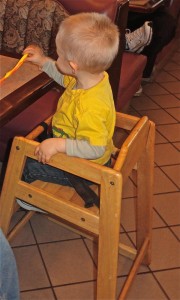 One of the hardest things about being a father of a little boy is realizing that he is not a little man.
One of the hardest things about being a father of a little boy is realizing that he is not a little man.
Let that sink in for a few minutes.
I think that one of the hardest things about being a father is working through our son’s transition from infant to toddler to preschooler and on up the development path. And one of the toughest aspects of that for us fathers is the realization that at no place along that path is he just a small version of an adult. He is a child, And children do childish things.
But this is critical for us as fathers to understand if we are going to manage our expectations, or even have reasonable ones in the first place. Here is what I mean by this. A toddler, for example, is not developmentally able to behave like, think like or even sit like you or I are. But yet, many times we find ourselves out to dinner with our family and in a crowded restaurant. And the next thing we know, little “Junior” is squirming or fidgeting and generally making us aware that he is getting a little bored with life. He may even toss a few french fries onto the floor in his own frustration. Of course we don’t want to be embarrassed by our child’s behavior in the restaurant because I am sure the other patrons in the restaurant have never seen a fidgety child . . . (insert sarcasm here) Little junior starts to fuss and he does so in ever increasing levels until he gets our attention. And he soon gets our attention. But is probably not the attention little Junior is looking for.
Now imagine yourself in a business meeting at the office or in a business conference or seminar. The speaker has droned on for an eternity. What do you do in this situation? Do you fidget or squirm? You probably do a little bit. Do you throw french fries on the floor? You probably do not.
Why don’t you?
Here is where the developmental differences between “little men” and “big men” are obvious. We don’t throw food on the floor because we know in our minds that this meeting will end some time. And we can verbalize to those around us through socially acceptable means that we are frustrated and want this meeting to end. We may even send text messages to our colleagues back in the office and tell them how lame this whole meeting is.
The problem is that little Junior can’t do that. He doesn’t have the developmental capacity to know that this too shall pass and that if he just hangs on a little while longer he will be out of the booster seat and onto the great adventure that awaits his little hands and feet after dinner.
So what is the principle here for Fatherhood Friday?
It is that one of the toughest things about parenting is understanding what our children are actually capable of at each developmental stage of their lives. Many times we fall into the trap of having unrealistic expectations for what our child is capable of doing. And that is especially true if our children are intellectually very bright and in a situation where their intellectual capacity is greater than their verbal capacity. And we expect that they are capable of certain behaviors just because they are very bright and inquisitive.
In conclusion let me share a great piece of advice that I was given when my children were very young. I was told to try and determine what my child could or could not do as distinguished from what they would or would not do. And many times we get frustrated when we think our kids will not when they in fact simply can not yet.
Photo credit: freefotouk / Foter.com / CC BY-NC
and
Photo credit: Lynn Kelley Author / Foter.com / CC BY-NC-SA



Please note: I reserve the right to delete comments that are offensive or off-topic.